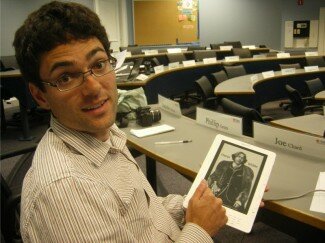Kindle class: Darden tests e-book
 Literary figures like Oscar Wilde become screensavers on Kindle, explains new Darden student Joe Chard.
Literary figures like Oscar Wilde become screensavers on Kindle, explains new Darden student Joe Chard.PHOTO BY LISA PROVENCE
Joe Chard just started the MBA program at Darden business school, and he just got a Kindle, Amazon's electronic reader.
"I had it on the coffee table, and my wife put a cup of coffee on it," says Chard. "I said, 'No– it's expensive.' She thought it was a book."
And with Darden-emblazoned leather "jackets" on the test Kindles, they do look like slender volumes.
Chard is one of 60 students from the class of 2011 chosen to try out the wireless reading device that could obsolete books in a pilot program with Amazon.
"I was really excited when I heard they were using them," says Chard. "Then I heard it was only one section, not the whole class." The incoming class is divided into five sections, and Chard was relieved to be in the section getting the e-readers.
"I'm a little bit leery of it," says section-mate student Liz Brower, "because I'm traditional." Kindle use is not mandatory, but she's willing to give it a shot.
Even among faculty, pleased with the prestige of Darden being one of Amazon's chosen seven schools– the others are Princeton, Arizona State, Case Western Reserve, Pace, University of Washington and Reed College in Oregon– there's a bit of apprehension.
"I'm a book person," says associate dean Robert Carraway. "It scared me."
However, he touts the improved screen size and lighting of the latest model, the DX, its light weight (18.9 ounces), and how it solves certain reading dilemmas, such as, "When you're rushing to catch a plane and trying to decide which two books to grab."
And the New York Times, Washington Post and Boston Globe are available on Kindle at reduced subscription rates.
Reducing paper consumption at Darden was one of the goals. "That really resonated with me because of Darden's sustainability initiative," says Michael Koenig, Darden's liaison with Amazon who envisions "a paperless MBA."
Darden is the only business school in the pilot program, and its case studies will be available to the students on Kindle as well as on paper, at least for the first year. Students who wish to keep their retail-$299 Kindles at the end year may do so for $200.
Whether Kindle will be the reading device of the future, Koenig can't say. "We were not convinced it had value, but were eager to test it out," he notes, citing Darden's innovative spirit.
Joe Chard plays with his Kindle like a kid with a new toy. "It's really easy to read," he says, and demonstrates how if the angle of the Kindle changes from vertical to horizontal, the text changes to be readable from the different angle as well.
But watch the coffee. If anyone's Kindle gets broken, says Koenig, "We're not going to invest in another."
1 comment
Now maybe the money-obsessed little Dardenites can finally learn how to read.